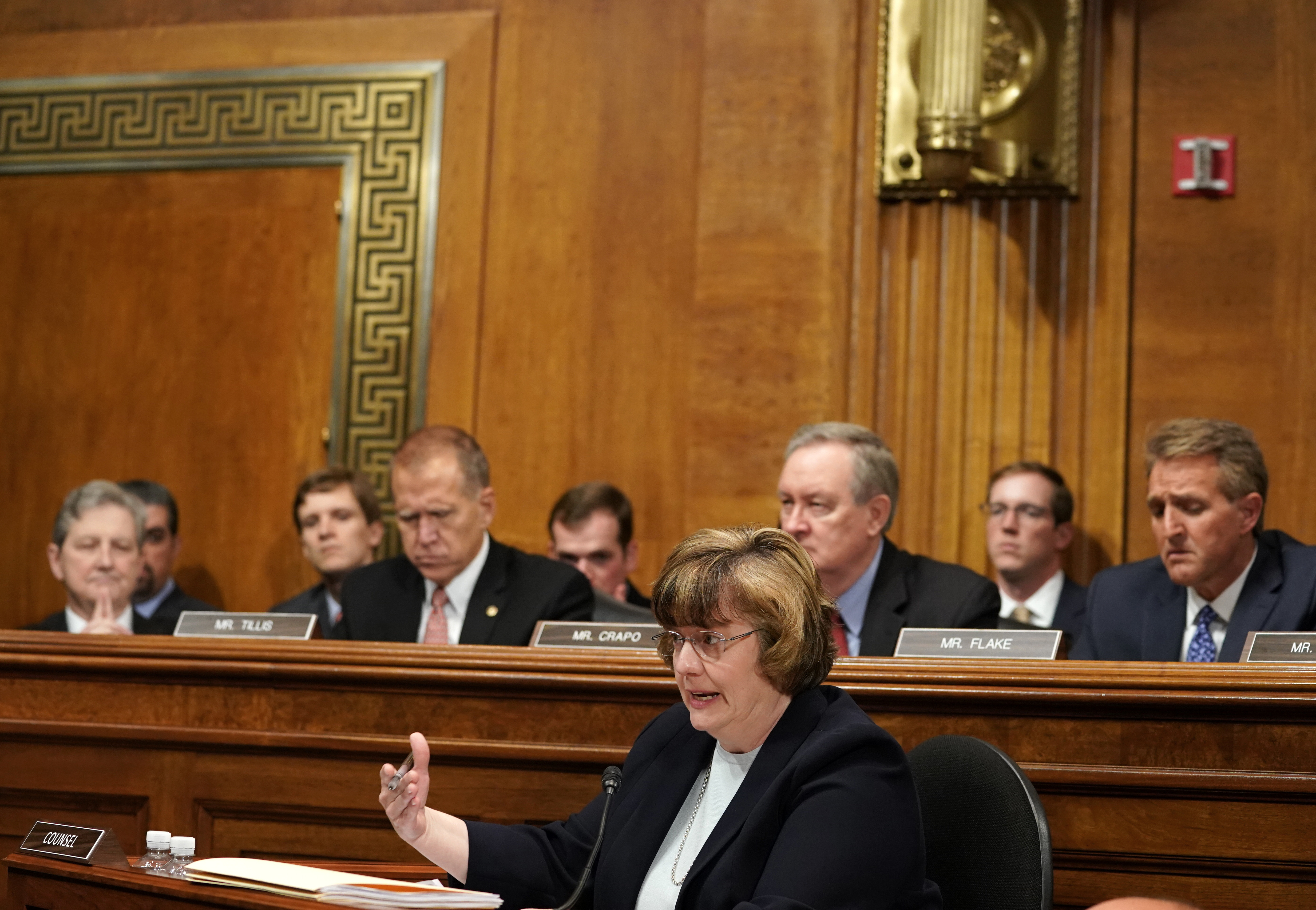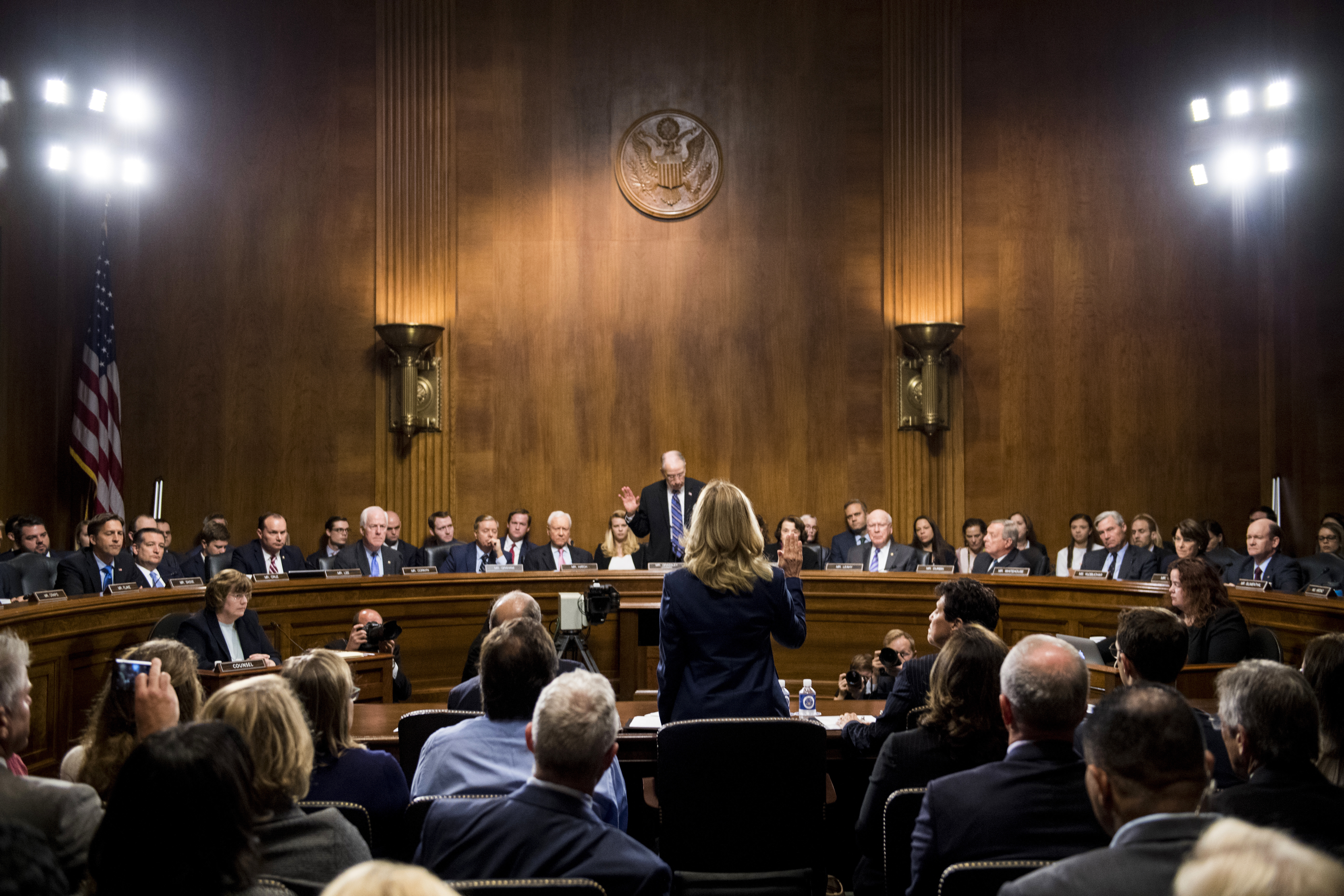
Christine Blasey Ford has told a US Senate committee and a riveted nation that Supreme Court nominee Brett Kavanaugh sexually assaulted her in a locked room at a 1980s high school gathering.
“I believed he was going to rape me,” said Ms Ford, 51, her voice breaking during the extraordinary hearing before the Senate Judiciary Committee.
Expressing certainty that Mr Kavanaugh was her alleged attacker, the California psychology professor explained how the brain remembers traumatic events.
“Indelible in the hippocampus is the laughter, the uproarious laughter of the two,” she said, referring to Mr Kavanaugh and a friend who was with him.
Ms Ford told the committee that, one night in the summer of 1982, a drunken Mr Kavanaugh forced her down on a bed, “groped me and tried to take off my clothes”, then clamped his hand over her mouth when she tried to scream before she was able to escape.
Mr Kavanaugh, 53, has denied Ms Ford’s and other women’s allegations of sexual misconduct in a clash that has underscored America’s political and cultural fault lines.
But the accumulating accusations have raised questions about whether Republican leaders will be able to hold Republican senators behind President Donald Trump’s nominee.

The conservative jurist, whose Senate confirmation had seemed assured until Ms Ford and the other women emerged, awaited his own chance to give evidence later in the day.
With millions watching on television, Ms Ford told the top committee Democrat, California Senator Dianne Feinstein, that she had “agonised daily” over coming forward about the alleged decades-old attack.
She said she feared the personal consequences would be akin to “jumping in front of a train”.
In fact, both she and Mr Kavanaugh have received death threats.
Republicans have challenged Ms Ford’s and the other women’s allegations, in part because it took them years to come forward.

But when Ms Feinstein asked her how she could be sure that Mr Kavanaugh was the alleged attacker, Ms Ford said: “The same way I’m sure I’m talking to you right now.”
The judiciary panel’s 11 Republicans – all men – let Rachel Mitchell, a veteran sex crimes prosecutor from Arizona, ask their questions.
She began by expressing sympathy for Ms Ford, saying: “I just wanted to let you know, I’m very sorry. That’s not right.”

Ms Mitchell led Ms Ford through a detailed recollection of the events she says occurred on the day of the alleged incident.
But under the committee’s procedures, the career prosecutor was limited to five minutes at a time, interspersed between Democrats’ questions, creating a choppy effect as she tried piecing together the story.
Before she began, committee chairman Chuck Grassley defended the Republicans’ handling of the confirmation proceedings so far.

Ms Feinstein criticised Republicans who have rejected Democratic demands to slow Mr Kavanaugh’s confirmation process and let the FBI investigate all the allegations, saying: “What I don’t understand is the rush to judgment.”
Mr Kavanaugh and Ms Ford are the only witnesses invited to give evidence before the panel.
But the conservative jurist is facing allegations of sexual misconduct from other women as well, forcing Republican leaders to struggle to keep support for him from eroding.
Mr Grassley complained that lawyers for other accusers have not provided information to his panel, and said: “The committee can’t do an investigation if attorneys are stonewalling.”

Republicans acknowledged that much was riding on Mr Kavanaugh’s performance.
Even Mr Trump, who fiercely defends his nominee, said he would be watching and was “open to changing my mind”.
Republicans are pushing to seat Mr Kavanaugh before the November midterms, when Senate control could fall to the Democrats and a replacement Trump nominee could have even greater difficulty.
Mr Kavanaugh’s ascendance to the high court could help lock in a conservative majority for a generation, shaping dozens of rulings on abortion, regulation, the environment and more.
Republicans also risk rejection by female voters in November if they are seen as not fully respecting women and their allegations.


Comments: Our rules
We want our comments to be a lively and valuable part of our community - a place where readers can debate and engage with the most important local issues. The ability to comment on our stories is a privilege, not a right, however, and that privilege may be withdrawn if it is abused or misused.
Please report any comments that break our rules.
Read the rules here